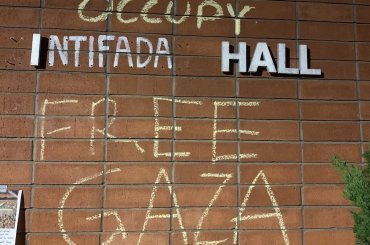Last month Tufts University’s Students for Justice in Palestine (SJP) launched a Boycott, Divestment and Sanctions (BDS) campaign on campus. There’s been many these efforts at schools across the country, but Tufts SJP’s marks an interesting shift in strategy. The group is asking students to sign a pledge to stop purchasing Sabra or Pillsbury products, as the two companies are directly connected to the illegal Israeli occupation. It also calls on signers to refrain from participating in Birthright, applying to a summer fellowship sponsored by the pro-Israel Anti-Defamation League, or joining pro-Israel groups on campus. The push builds off momentum from a 2017 campaign, where Tufts’ undergraduate student senate passed a resolution calling on the university to divest from companies connected to Israel’s illegal occupation, but the school never took action.
Some of the students spoke with Mondoweiss, but asked to have their full names omitted. “We wanted to continue to push BDS on this campus but not have it be something where we put all this work into achieving something that the university can just say no to,” said Ava, a Tufts SJP member. “So this campaign is trying to get students to sign pledges that say they will adhere to BDS until Palestine is free and will continue to do so even after Tufts. If, as a secondary effect, if people stop buying Sabra hummus so Tufts stops seeing it reasonable to buy Sabra hummus anymore, that would be a really exciting bonus.”
The current BDS campaign has faced backlash from pro-Israel campus groups and even the administration itself. “It is particularly disappointing that [SJP] have chosen to ask fellow students to boycott not just companies but other student groups on campus,” said Tufts’ executive director of media relations Patrick Collins in a statement to the school’s newspaper, The Tufts Daily “[SJP’s] most recent campaign is divisive and harmful. It doesn’t help foster important conversations – rather, it shuts them down while ostracizing fellow students.”
This isn’t the first time that the administration has clashed with students over a campaign involving Israel. In 2020 the student body passed a referendum calling on the university to end its participation in “Deadly Exchange,” a program that sends U.S. police to Israel to be trained by the country’s military and security forces. Not only did the school ignore the vote, they condemned the Office for Campus Life for giving SJP an award for their activism.
Tufts President Anthony Monaco, Provost and Senior Vice President Nadine Aubry, Dean of the School of Arts & Sciences James Glaser, Dean of Student Affairs and Chief Student Affairs Officer ad interim Nancy Thompson, and Dean of the School of Engineering Jianmin Qu all signed onto the statement after Tufts SJP received the annual Collaboration Award. “We strongly disapprove of this award in light of SJP’s concerning policy positions, including its association with the BDS movement, elements of which we view as anti-Semitic,” it reads. “We will be reviewing the awards process, which currently does not involve academic deans or senior university leadership and this year did not include students, in order to ensure proper oversight and review going forward. We as senior leaders take responsibility for this outcome, which should not have happened, and recognize that the award has caused a great deal of pain and concern for Jewish members of our community and others who share concerns about SJP’s policy positions, particularly in light of rising anti-Semitism in the U.S. and around the world.
“The school’s reaction is not unexpected considering how they reacted to ‘Deadly Exchange’ campaign, but the idea that it’s divisive and this idea that we’re asking people to boycott students is just false,” Tufts SJP member Sabrina told Mondoweiss. “You can’t boycott a person and clubs are not people.”
One of the clubs included in the boycott call is the school’s J Street chapter, who has SJP has collaborated with in the past. Their inclusion comes just months after friction developed between Rep. Jamaal Bowman’s (D-NY) and Democratic Socialists of America (DSA) over the congressman traveling to Israel on a trip sponsored by the liberal Zionist organization.
“J Street officially advocates for ‘peace’ through a ‘two-state solution.’,” read Tufts SJP’s petition. “While it may seem innocuous to frame the occupation as a conflict between two equal nation states, and the solution as a simple division of land right down the middle, this perspective fails to recognize Israel as a settler colonial state and Zionism as a white supremacist ideology.”
Violet Kopp, a co-chair of J Street U Tufts, told The Tufts Daily said the group was in close contact with SJP leading up to the boycott call, but said she was confused about why J Street was ultimately included. “We think that, as a club, we have a lot more ideological similarities with [SJP] than not.”
“I think dialogue needs to be central to any social justice movement,” Kopp continued. “That’s not to say that it should be in the place of tangible solutions and structural change and oppressors’ taking onus and responsibility and undoing the harm they’ve done, but you can’t get there without having conversations.”
Ava stressed that they didn’t take the decision lightly and debated the decision in detail. “One thing we can agree on is that anti-Zionism is not antisemitism,” she said. “You can critique Israel and as a Jewish person you can have a strong moral and political stance against Israel. With that being said, I think the reason the discourse has shifted is that liberal Zionists, even if they’re anti-occupation and the framework they use to talk about the issue might sound more humane than anti-Palestinian or Islamophobic rhetoric, they’re still not acknowledging the fundamental cause of Palestinian resistance. It’s not just the occupation, it’s also the colonization of historic Palestine going back even before 1948.”
The has campaign has also caught the attention of pro-Israel lobbying groups like CAMERA, who have denounced it as “reprehensible incitement against the Jewish community.”
Tufts SJP point out that, despite the backlash, reception to the petition has been encouraging, as nearly 200 students have already vowed to boycott. “Largely the students have had a very positive response to our campaign and have been really interested in learning more about what BDS is, so I think the negative coverage does come from the fact that the administration and these clubs are a vocal minority,” said Sabrina.



Wouldn’t you love to see a debate between the BDS supporters and the Zionists, with the Zionists forced to try to defend Israel………
1 of 2
“We strongly disapprove of this award in light of SJP’s concerning policy positions, including its association with the BDS movement, elements of which we view as anti-Semitic.”
_____
This statement reveals two central flaws in Zionism’s campaign to impose the IHRA “definition” of antisemitism on American society:
First, the phrase “which we view” demonstrates that the Tufts University president and staff are applying subjective, as opposed to objective, criteria to justify their actions. This is the imperium at work.
Second, they abandon the historic American lexical tradition of using descriptive criteria for definitions as opposed to prescriptive criteria. This is collaborationism at work.
If anyone can inject their personal, particularist opinions into official documents under the guise of policy, then the value of that term loses any claim to validity. This is so because it lacks the elements critical to public acceptance of a dictionary or its contents: accuracy and trust.
Dictionary usage must be voluntary and without that feature the term is no longer a “definition” but rather a diktat, which is defined as:
An order or decree imposed by someone in power without popular consent
The Tufts administration uses deft proceduralism to impose IHRA because that is the context that most pleases their funders, superiors, some alumni and at least some staff and faculty. They privilege this definition because they are operating under duress and seek a way, any way, to restore the status quo ante as quickly as possible at no cost to themselves.
To understand Tufts’ position we must understand that the administration is operating out of fear of political Zionism and its reputation for painful retaliation. Attacking the SJP and the students is the fastest, easiest and cheapest way for Tufts to show rabid fealty to Zionism without engaging a powerful opponent.
Pure, simple, cynical Trumpian power politics at work.
Tufts’ predictable response is brilliantly explained as a form (there are several) of Ketman – the practice of paying lip service to some authority while concealing secret opposition – in the 1953 book, The Captive Mind by the Polish writer, poet, academic and Nobel laureate Czesław Miłosz:
Professional Ketman, the acceptance of Stalinist [Zionist] standards only to allow one to continue to pursue a desired career path.
I’m a graduate of Tufts (BSCE in 1968) and none of this surprises me at all. I remember as far back as the mid 60’s, during my undergraduate years, when my calls for, at a minimum, a discussion of the Occupation were met with cold silence. When I returned for reunions (last time in 2013), things had opened up somewhat, but there was still strong resistance from the administration. It’s certainly encouraging to see SJS standing strong against the Zionist-controlled gatekeepers at Tufts and hope I live to see the day when free and open discussion of the issue will prevail at this, one of the otherwise most respected universities in the country.
2 of 2
This is based on the idea of having only a single life and therefore using the time to the best of one’s ability to pursue artistic or scientific innovation, which requires at least tolerating Socialist Realism [Hasbara] and other such censorship standards in order to continue one’s work. (Substitute terms in brackets are mine. DW)
One can imagine the following conversation taking place in every university, corporation, foundation, government agency and Congressional or state legislative office facing a Palestine solidarity action:
A) The students/voters/customers/ have just organized a solidarity march to stand with the people of Palestine. What do we do?
B) We do as we were schooled to do: we oppose them any way we can.
A) Got specifics?
B) Well, first we issue an immediate statement condemning the action, label it insensitive, inciteful and of course, antisemitic.
A) But the group doing the organizing is Jewish!
B) Not a problem. We call them “misinformed” and “misguided” for now. The important thing is that we demonstrate our loyalty to Israel and Zionism. We will get clearer, more specific instructions in the morning.
A) What do we do to explain away the fact that the students/voters/customers got permission, met all the deadlines, have valid status and have faculty/political/public support?
B) We do what we always do whenever Palestine is mentioned: We claim that there are “issues” with the process; questions of timing; the likelihood of “incitement”; a challenge to university/electoral/corporate/ values and history; the possible discomfiting of Jewish students and any other tactic we were taught to diminish the demonstrators or better, “rioters”.
A) Will that work?
B) So far, it always has.
To those Tufts University administrators who say I am wrong I say: Release your emails. Agree to meet with the SJP representatives and answer all their questions. Agree to make no changes in the school’s awards programs without a university-wide referendum. If this were to occur and I was proven wrong in my analysis I will publicly apologize here at Mondoweiss.
Dear President Anthony Monaco, et. al.: your move.
Q: Is it antisemitic according to IHRA to raise these issues or to fail to raise them?
View here 500+ Palestine posters on the subject of Canceled-Censored-Compromised-Criticized-Blacklisted events